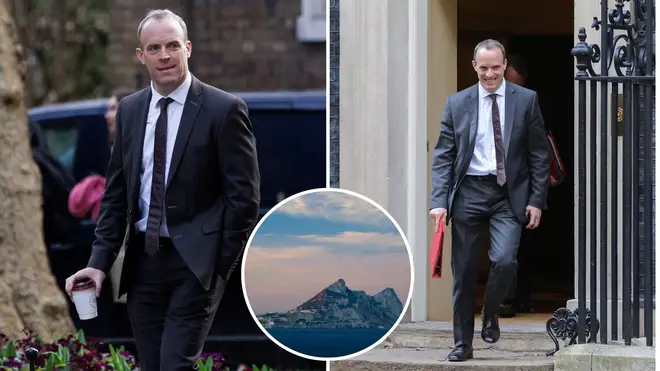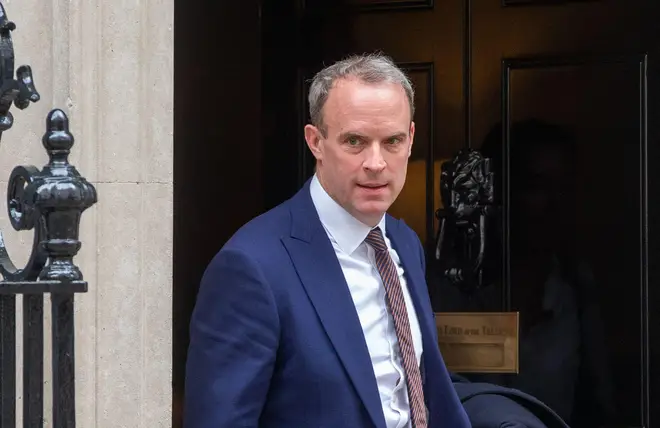
Clive Bull 1am - 4am
21 April 2023, 23:11 | Updated: 22 April 2023, 08:39

Dominic Raab's career as deputy prime minister was effectively ended by an argument about Spanish troops being stationed permanently in Gibraltar, after the British ambassador to Spain allegedly went beyond what he had been authorised to offer.
Mr Raab, who was Foreign Secretary at the time, heard that Spain was complaining about the UK changing its position on negotiations about keeping the land border open with Gibraltar, a small British territory at the bottom of the Iberian peninsula.
The British stance had always been that no Spanish troops would ever be stationed permanently in Gibraltar.
Perplexed at the complaints from Spain, Mr Raab investigated and heard that the ambassador to Spain, Hugh Elliott, may have gone beyond the official position agreed by the Cabinet and offered to have Spanish 'boots on the ground' permanently, the Telegraph reported.
The minister then ordered Mr Elliott back from Spain to London to give an account of his actions. But his explanations were not specific enough, according to supporters of Mr Raab.
The Foreign Secretary replaced Mr Elliott in negotiations with the former ambassador Simon Manley, although Mr Elliott remained the top British diplomat in Spain.
Mr Raab resigned on Friday following a bombshell report into claims he bullied officials. Two of the 15 complaints were upheld. One was a complaint about the Gibraltar suggestion.
Adam Tolley, who led the investigation into Mr Raab's conduct, said: "As part of the process towards and implementation of this management choice, he [Mr Raab] acted in a way which was intimidating, in the sense of unreasonably and persistently aggressive in the context of a workplace meeting.
"His conduct also involved an abuse or misuse of power in a way that undermines or humiliates. In particular, he went beyond what was reasonably necessary in order to give effect to his decision and introduced a punitive element.
"His conduct was bound to be experienced as undermining or humiliating by the affected individual, and it was so experienced. I infer that the Deputy Prime Minister must have been aware of this effect; at the very least, he ought reasonably to have been so aware.”
It comes after Mr Raab hit out at "activist" and "passive-aggressive" civil servants on Friday, who he claimed were trying to block the government's agenda.
The former justice secretary said there was a "very small minority of very activist civil servants" who are against some reforms, and who are "effectively trying to block government".
Mr Raab told the BBC: "That's not on. That's not democratic." He added that civil servants acting in this "passive-aggressive way" meant that the "government can't deliver for the British people".
Adam Tolley KC's independent probe - which covered 15 claims since 2018, during his stints as Brexit secretary, foreign secretary and justice secretary, cleared Mr Raab of several allegations of bad behaviour, including findings that he did not swear or use physical gestures to threaten.
But it found he was "intimidating" in the context of a work meeting. It also found that civil servants had "no ulterior agenda".
Mr Raab quit on Friday with a furious resignation letter in which he claimed the inquiry's findings were "flawed" and created a dangerous precedent by setting the threshold for bullying "so low
He later slammed what he called a "Kafkaesque saga" for which the British people would pay the price, adding that the investigation had set a "playbook for a small number of officials to target ministers".
The findings landed on Prime Minister Rishi Sunak's desk on Thursday morning, but the results were not initially revealed.
Read more: Read in full: Dominic Raab's furious resignation letter to the prime minister
Despite criticism overnight, including from his own ministers, over Mr Sunak's delay in deciding his fate, No 10 sources said the prime minister did not tell his deputy to resign.
In his Telegraph article, Raab wrote: "The British public expect ministers to exercise rigorous oversight over officials to prevent democratic mandates being unpicked, raise the game of underperforming parts of government, and prevent Whitehall from squandering taxpayers' money.
My resignation statement.👇 pic.twitter.com/DLjBfChlFq
— Dominic Raab (@DominicRaab) April 21, 2023
"Likewise, ministers should be held to the same standards as everyone else.
"In reality, the Kafkaesque saga I endured was shorn of the safeguards most people enjoy."
He added: "The inquiry accepted that I had not personalised my criticism, nor intended to upset anyone, and was unaware of the offence caused. That was never my intention, and I am genuinely sorry if my actions had that effect on anyone.
Read more: Furious Dominic Raab quits with blast at civil servants after bullying probe upholds two complaints
"The inquiry concluded that I had not been notified of any particular conduct, before formal complaints were submitted, nor had anyone suggested my behaviour could amount to bullying.
"This precedent sets the playbook for a small number of officials to target ministers, who negotiate robustly on behalf of the country, pursue bold reforms and persevere in holding civil servants to account.
"If that is now the threshold for bullying in government, it is the people of this country who will pay the price."
If that is now the threshold for bullying in government, it is the people of this country who will pay the price.
Mr Raab said he was "subject to trial by media for six months" and human resources standards he said would be found "in any other workplace" were not applied to him.
He argued in his separate resignation letter to Rishi Sunak that the inquiry set the "threshold for bullying so low" that it could "encourage spurious complaints against ministers, and have a chilling effect on those driving change on behalf of your government - and ultimately the British people".
He also took aim at what he called "systematic leaking of skewed and fabricated claims" he said breached the inquiry's rules and the Civil Service code of conduct.
The report concluded "he acted in a way which was intimidating, in the sense of unreasonably and persistently aggressive conduct in the context of a work meeting".

"It also involved an abuse or misuse of power in a way that undermines or humiliates. He introduced an unwarranted punitive element," the report said.
It added that while meeting policy officials, Mr Raab "acted in a manner which was intimidating, in the sense of going further than was necessary or appropriate in delivering critical feedback, and also insulting, in the sense of making unconstructive critical comments about the quality of work done (whether or not as a matter of substance any criticism was justified)".
He found Mr Raab "complained about the absence of what he referred to as 'basic information' or 'the basics', about 'obstructiveness' on the part of officials whom he perceived to be resistant to his policies, and described some work as 'utterly useless' and 'woeful'".
Mr Tolley said he conveyed a threat to a civil servant by referencing the Civil Service code of conduct that had "a significant adverse effect on a particular individual who took it seriously" during his time as foreign secretary.
"The DPM's conduct was a form of intimidating behaviour, in the sense of conveying a threat of unspecified disciplinary action, and was experienced as such," he wrote.
"He did not target any individual, nor intend to threaten anyone with disciplinary action. However, he ought to have realised that his reference to the Civil Service Code could well have been understood as a threat."
Mr Tolley praised the officials for coming forward and found they had "no ulterior agenda".

James O'Brien and Andrew Marr discuss Raab's resignation
The report said Mr Raab described his style as "inquisitorial, direct, impatient and fastidious", and that he typically works from 7.30am to 10pm Monday to Thursday.
It said Mr Raab believed once a decision on policy is taken, it should not be revisited by civil servants.
But he was cleared of making physical gestures in a threatening way, with Mr Tolley writing that the most extreme claim given was him putting his hand out to a person's face to stop them talking.
He also cleared Mr Raab of shouting and swearing at staff, saying he "did not swear at any individual or swear more generally".
He was also unable to find in favour of Ministry of Justice civil servants who complained of a "perverse culture of fear" and unreasonable work deadlines.
The Prime Minister's official spokesman said in the wake of Mr Raab's resignation and article: "You can see the aspects relevant to the code are set out in the report. I think those speak for themselves.
"The Prime Minister thinks it's right that any findings whatsoever that are deemed to be bullying, it's right to resign. That's the commitment the former secretary of state made and he's upheld that commitment."
He added: "Clearly, any bullying in general terms is unacceptable and there are clear rules that apply to that."
Dave Penman, the head of the FDA union that represents senior Whitehall employees, said the inquiry was a "damning indictment of the inadequacy of a process that relies solely on the Prime Minister of the day to enforce standards".
His union says one in six senior civil servants have seen misconduct take place in the last year.
"This demonstrates that Raab is not just one bad apple, and there is a wider problem with ministerial bullying than the Prime Minister wants to admit," Mr Penman added said.